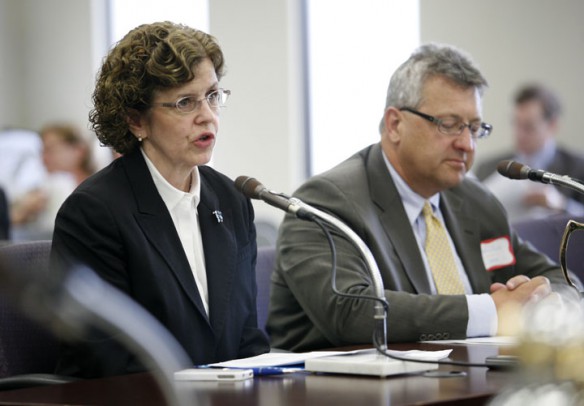
KSTC president Joanne Lang and NMSI Regional Director Dale Fleury announce the newest schools to be added to the AdvanceKentucky program during the Kentucky Board of Education meeting. Photo by Amy Wallot, April 4, 2012
By Matthew Tungate
matthew.tungate@education.ky.gov
Schools where teachers believe they have community support and involvement and student conduct is well-managed do better in reading and mathematics achievement, according to the final report from the TELL Kentucky survey.
More than 42,000 educators across the commonwealth filled out the anonymous online questionnaire regarding working conditions as part of the Teaching, Educating, Leading and Learning (TELL) Kentucky survey, which was administered to all public school teachers and principals in March 2011. Questions on the survey pertained to time; facilities and resources; community support and involvement; managing student conduct; teacher leadership; school leadership; professional development; instructional practices and support; and new teacher support.
Ann Maddox of the New Teacher Center provided the Kentucky Board of Education with copies and a presentation of the report at the board’s April 4 meeting. Maddox said the final report includes results connecting student academic data to survey results, as well as breaking out opinions of principals and new teachers.
At the elementary, middle and high school levels, the correlation between community support and involvement and student conduct “cannot be understated,” she said.
In fact, the five largest differences between how teachers at high-achieving schools answered survey questions versus teachers at schools with low achievement all pertained to either community support and involvement or student conduct.
For instance, 84.8 percent of teachers at high-achieving schools agreed with the statement “Parents/guardians support teachers, contributing to their success with students.” Only 53.9 percent of teachers answered the same at low-achieving schools.
The survey also looked at why teachers leave or stay at their schools. Maddox said the belief that school leadership consistently supports teachers is the biggest difference between those teachers staying at a school and those who are looking to change schools.
Overall, new teachers (those with 0-3 years’ experience) were generally positive in their perception of their school, but that perception drops steadily for teachers with 7-10 years’ experience, she said.
“This is the time teachers typically decide to move out of teaching,” Maddox said.
But rather than continuing to dip, teacher positivity begins to increase from that point with more experience, she said.
Board Chairman David Karem said, “Maybe we need to do something to address lessening the dip.”
Schools already are incorporating their TELL Kentucky data to improve their schools, according to Susan Allred, interim associate commissioner of the Office of District 180. She said Kentucky’s persistently low-achieving schools are using the data to prioritize what they want to address in school improvement plans.
“Once the next one is given, we should see improvement where they have provided intervention and strategies,” she said.
AdvanceKentucky expands, foundation for innovation discussed
Several other strategies and programs for improving Kentucky schools were included on the board’s agenda.
Representatives of AdvanceKentucky, an initiative designed to increase the number of minority and low-income students taking and passing Advanced Placement (AP) classes, announced the program is now working with an additional 16 schools, bringing the total to 80 in Kentucky. (A list of all the schools the program works with can be found on its website.)
“We think we’re making gains in being able to reach those populations,” said Joanne Lang, the executive director of AdvanceKentucky.
AdvanceKentucky involves content-rich teacher training and extensive support and incentives for students and teachers for achieving qualifying scores (3 or higher) on AP exams in mathematics, science and English.
AdvanceKentucky is funded by a $13.2 million grant from the National Math and Science Initiative (NMSI), which is supported by ExxonMobil, Dell and Gates foundations, Lockheed and others.
Grants and partnerships is what a proposed foundation will be seeking to help spur innovation in Kentucky’s schools. The board agreed at its meeting to allow the Kentucky Department of Education to begin setting up the independent non-profit foundation.
Under the proposed plan, the foundation would “exist to catalyze bold, comprehensive change in Kentucky’s educational system.” Under a proposed timeline, the foundation would be formed by the end of this month and begin operating as an independent entity in July.
David Cook, KDE’s director of the Division of Innovation and Partner Engagement, said the department wants the foundation to solicit additional funding, particularly for innovation, and partner with the department to help expand successful programs.
“The foundation simply serves as a conduit for the board’s strategic goals to be laid out,” he said.
He said KDE is following the example of the Colorado Legacy Foundation. He expects the foundation to raise money for pre-k through college, he said.
Board member Mary Gwen Wheeler asked if the foundation shifts who pays for education.
“I’m deeply concerned this allows the (state) legislature off the hook for fully funding education,” she said, adding that she would prefer the private sector form such a foundation.
Commissioner Terry Holliday said he and Robert King, president of the Kentucky Council on Postsecondary Education, tried for a year to get someone in the private sector to do so, and he estimated it would be three to five years more for that to happen.
“We’ve got districts ready to create districts of innovation, but we’ve got no money to give them,” he said. “It’s just the right time.”
In other business, the board:
- heard that the department is re-filing two regulations dealing with the Unbridled Learning: College and Career Ready for All accountability model: one dealing with school and district accountability recognition, support and consequences, and the other with accommodations during state-required testing.
- approved a regulation changing how teachers and principals will be evaluated. The proposed Teacher and Principal Professional Growth and Effectiveness System is being field tested, but the state board had to approve its principles to meet requirements of the federal No Child Left Behind (NCLB) waiver. Holliday said the board will have to vote on details of the system, likely in October 2013, for statewide implementation in fall 2014.
- reviewed a regulation regarding the use of restraint and seclusion on students. The board will review the regulation again at its June meeting.
- heard about data quality and the Kentucky P-20 Data System.
- recognized member Dorie Combs, who is leaving the board.
The Kentucky Board of Education’s next meeting will be June 6 in Frankfort.



Leave A Comment